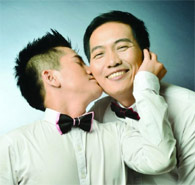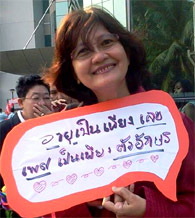Thailand's open attitude to homosexuality has often been widely attributed to it being a predominantly Buddhist country. That view is however inaccurate, as academic Peter Jackson wrote in Queer Dharma: voices of gay Buddhists. "(P)opular Western perceptions of a general tolerance of homosexuality in Thailand are to an extent inaccurate. While there are no legal or formal sanctions against homosexuality in Thailand, a wide range of cultural sanctions operate to stigmatise Thai homosexual men and women. These anti-homosexual sanctions are diffused throughout Thai Society rather than being focused in any clearly definable institution or set of homophobic practices, as has historically been the case in most Western societies."


As Thailand is currently debating civil unions which will offer same-sex couples the same legal rights as heterosexual married couples, many are wondering if there can be any objection based on religiously motivated arguements as nearly 95% of Thailand's population are practitioners of Theravada Buddhism.
Anjana Suvarnananda, a pioneer Thai LGBT rights activist and founder of Anjaree Foundation, originally formed as a Thai group for women loving women and presently focusing on sexual rights, has urged Buddhists who hold anti-LGBT views to not be alarmed and complicate the situation. She also advised other LGBT activists to not get trapped in a debate with Buddhists on whether Buddhism allows same-sex marriage.
"No monks have ever spoken through the media to denounce gays or lesbians. This is perhaps because they may see the matter as worldly," Anjana told The Nation newspaper.
She suggests that Buddhists should be more concerned about the degradation of Buddhism in Thailand with regard to financial impropriety, the growing popularity among Thais of taking a trip to pay respects to nine temples in the hope of accruing good merit, and the lack of loving kindness amongst some self-professed Buddhists.
"Some [of these people] donated money they cheated from others to temples - and yet they get recognition. We should pay more attention to such issues," said Anjana, stressing that Buddhism fundamentally sees human beings as equals, so same-sex marriage should be acceptable to Buddhists, according to the report published on July 27. She added that Thailand is a secular state and religious teaching should not influence laws or infringe on the rights of minorities, such as gays and lesbians.
The report further quoted Buddhist scholar Sulak Sivaraksa who said according to Buddhist teachings, lay people can have sex regardless of the gender of their partners. "It's normal," he said, adding that Buddhism doesn't see sex as primarily for pro-creation, unlike in Christianity and Islam.
Another Buddhist scholar, Suraphot Thaweesak, who was quoted said Buddhism only sees extra-marital affairs as wrong, but not same-sex marriage.











 打印版本
打印版本
















读者回应
请先登入再使用此功能。